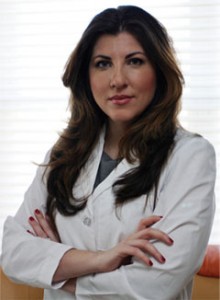How I Diagnose and Treat Pneumonia
Posted by admin on August 28th, 2013

“Pneumonia is usually caused by a virus or a bacteria and can make you feel very ill, particularly if you have underlying heart disease, diabetes or lung disease such as asthma or COPD. In people with chronic health conditions, weakened immune systems or the elderly, pneumonia can be life-threatening if left untreated. If you think you may have pneumonia, you should make an appointment to come in immediately”.
-Dr. Zimilevich, MD
What is pneumonia?
Pneumonia is an infection of the lungs. In pneumonia, the tiny air sacs that are responsible for gas exchange fill up with fluid and/or pus. This causes congestion of the lungs and is responsible for the coughing that is prominent in pneumonia. It may also cause difficulty breathing. Anyone can get pneumonia, but people with weak immune systems, the elederly and the very young are most at risk from this always serious and sometimes deadly disease.
What are the symptoms of pneumonia?
If you have pneumonia, you will usually feel quite ill and may feel sicker than you do when you have a cold. Symptoms may include:
- productive cough
- fever/chills
- chest pain
- difficulty breathing/shortness of breath
- decreased appetite
- sore throat (may be due to coughing)
- headache
- fatigue
- body/muscle aches
- GI upset (nausea/vomiting, diarrhea
- decreased level of consciousness (in the very ill)
- lower than normal body temperature (in the elderly or people with weak immune systems)
What causes pneumonia?
Pneumonia can be caused by bacteria, viruses or fungi. If you are healthy and young, your immune system can normally prevent microorganisms from invading your lungs, but if you are older, have a chronic health condition or your immune system is not up to snuff (i.e. you are being treated for cancer or your body is fighting another infection somewhere else) you may be at higher risk for pneumonia.
Pneumonia may occur on its own, or it may occur after you have had a cold or the flu as a secondary infection. This is why it is so important to get an annual flu shot– not only does it prevent the flu, but it can also stop you from developing a secondary pneumonia, which can be very serious when your immune system is exhausted from fighting the flu.
Pneumonia that occurs when you have been in the hospital for another reason is called hospital-acquired pneumonia. This type of pneumonia can be more difficult to treat than pneumonia that is community-acquired.
What can you expect when you come in to see me ?
When you come in to see me, I will want to know a little about your history (if you are a new patient). I will need to know if you have any health problems and whether you are taking any medications. I will also need to know if you are allergic to any medications.
I’ll ask you when your symptoms started. Have you had a cold or the flu? What symptoms are you experiencing? Does anything make them better or worse? Tell me as much as you can about your symptoms and how you have been feeling.
Once I have gathered some information, I’ll want to examine you. I will look in your ears and throat and feel your neck for swollen glands. I’ll listen carefully to your heart and lungs for abnormal breath or heart sounds. I may also examine your abdomen.
Based on my findings, I may order diagnostic tests such as a chest x-ray and blood work to look for signs of bacterial infection and perhaps dehydration.
Once I have all the information I need, we’ll discuss the results of my examination and any tests I may have ordered. If I believe you have pneumonia caused by a bacteria, I will prescribe antibiotics. If I order antibiotics it is important that you finish the entire course of antibiotics. If you are not better in a few days after starting your antibiotic, you should come back in to see me. If you have a viral pneumonia, antibiotics will not be helpful.
Other things you can do to speed your recovery include:
- drinking plenty of fluids (this helps to thin out the secretions in your lungs)
- get plenty of rest
- eat as healthily as you can
- manage your fever and muscle aches with an over-the-counter pain medication
- avoid smoking or being around people who smoke
{Note: if you are experiencing severe chest pain or shortness of breath, you should go to your nearest emergency room}
If you think you have pneumonia, you should not wait to be seen. Pneumonia is a very serious condition and can be life-threatening for the elderly, people with chronic health conditions and people whose immune systems are compromised. If you have symptoms of pneumonia, make an appointment now to come in and see me.
Our Location

6301 Mill Lane, Brooklyn, NY 11234.
(718) 942-4600



